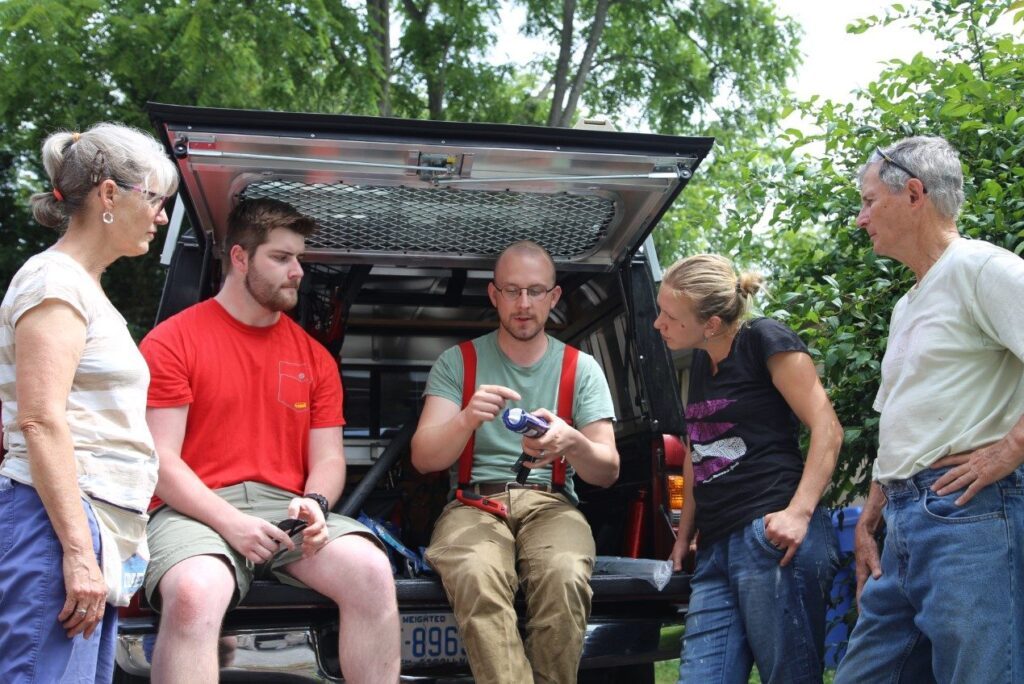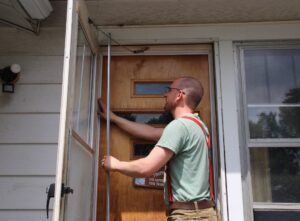The Asheville area is fortunate to have a variety of organizations on hand locally to help low-income residents face the challenges that can come with owning or renting a home.
Eblen Charities’ Energy Assistance program can help families pay for high utility bills. Others, like Mountain Housing Opportunities’ Emergency Home Repair program, can replace heating equipment for free.
Knowing that applications and eligibility can be intimidating for people, these organizations have staff available to help applicants through the process. However, there remain obstacles to connecting the support that is available to the families who need it.
Some families become overwhelmed by the daunting task of deciding which program to apply for or diagnosing what their home needs most, and as a result, they never end up seeking any help at all.

For this reason, through the efforts of the Energy Innovation Task Force, the Blue Horizons Project Energy Upgrade Program was launched in early 2018 to provide free home assessments to help low-income households prioritize improvements and connect to the right organization for support.
A free home assessment can do a lot for a family before any improvements are made to their home. In fact, it turns out that as much as a third of a home’s energy use can be avoided solely by changing occupant behaviors.
Parents often remind their children to turn off the lights and not leave the refrigerator door open, but what about washing clothes with cold water and adjusting your water-heater temperature setting? Sometimes even small changes to comfort settings can result in dramatic savings.
The assessment process may also suggest that a variety of improvements are needed, ranging from installing accessibility grab bars for the disabled, to sealing ducts or replacing windows.
So how does it all get done? First, by helping to prioritize improvements, and second, by connecting the residents with the right community resource to support.

Taking the time to go through this assessment process at the outset can make a big difference in how many improvements can be accomplished and how quickly they can be completed. Concerning improvements to occupant health, durability, and affordability, the ideal outcome is most effectively achieved when homes and their components are addressed as a whole.
Since the majority of the typical home’s utility expense goes towards occupant comfort, often the most significant opportunity for improving a home’s performance is to increase the retention of conditioned air. When a home keeps conditioned air in the right places, it doesn’t only make the house more affordable to heat or cool; it also improves indoor air quality and avoids damage caused by moisture ending up in the wrong places. This means that a lot of benefit can come to low-income families from merely sealing their home tight and ventilating it right.
The benefits of air-sealing are then multiplied when the home receives a new heating and cooling system. The right recipe of improvements from a variety of resources can help low-income families and the elderly enjoy graceful aging, stay in their homes longer and do so affordably.
But this initiative’s scope is not limited to its work with low-income clients. The Blue Horizons Project campaign is focused on leveraging energy savings across our entire community to create a cleaner energy future for Western North Carolina. (To learn more about the campaign as a whole, see page 48.)
If you or someone you know would like a free consultation and/or in-home energy assessment, email jonathan@bluehorizonsproject.com.
Jonathan Gach is the Blue Horizons Project’s Energy Upgrade Program Manager. His love for houses is motivated by his passion for fostering the ability to adapt to change. Through his work, he hopes people enjoy more resilient living through durable, healthy, and affordable homes.
You can also view this article as it was originally published on page 52 of the2018-2019 edition of the directory.

